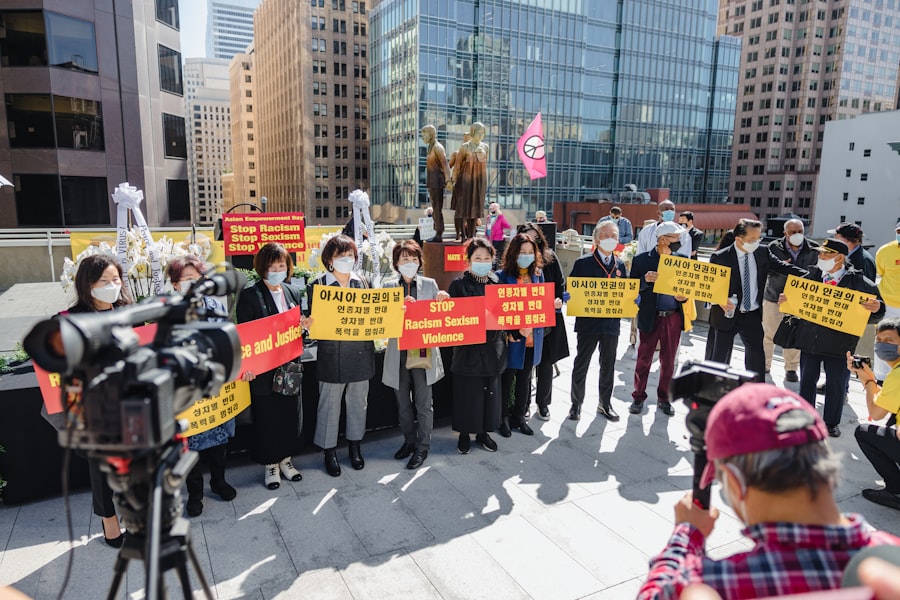In the realm of housing, power dynamics play a crucial role in shaping the experiences of tenants and landlords alike. As a tenant, you may often find yourself at a disadvantage, navigating a system that seems to favor property owners. Understanding these dynamics is the first step toward empowering yourself and your fellow tenants.
The landlord-tenant relationship is often characterized by an imbalance of power, where landlords wield significant control over living conditions, rent prices, and eviction processes. This imbalance can lead to feelings of helplessness among tenants, but recognizing it is essential for fostering collective action. You must also consider the broader socio-economic factors that contribute to these power dynamics.
Issues such as gentrification, rising housing costs, and systemic inequalities can exacerbate the struggles faced by tenants. By understanding these external influences, you can better articulate your concerns and advocate for change.
Key Takeaways
- Understanding the power dynamics: Recognize the imbalance of power between landlords and tenants and the impact it has on housing rights.
- Building tenant solidarity: Foster a sense of community and support among tenants to collectively address issues and advocate for their rights.
- Researching and documenting landlord practices: Gather evidence and information to hold landlords accountable for their actions and ensure transparency.
- Creating tenant associations: Establish organized groups to represent and advocate for the interests of tenants in negotiations with landlords.
- Holding landlords accountable: Take action to ensure landlords fulfill their responsibilities and address any violations of tenant rights.
Building Tenant Solidarity
Building solidarity among tenants is vital for creating a united front against oppressive landlord practices. When you connect with your neighbors and fellow renters, you foster a sense of community that can be incredibly empowering. Start by organizing informal gatherings or meetings where tenants can share their experiences and concerns.
These discussions can help identify common issues, whether they relate to maintenance problems, rent increases, or harassment from landlords.
As you build this solidarity, consider forming a tenant union or association.
This formal structure can provide a platform for collective bargaining and advocacy. When tenants come together, they amplify their voices and increase their leverage in negotiations with landlords. A united group can demand better living conditions, fair rent prices, and respect for tenant rights.
Remember, strength lies in numbers; when you stand together, you are less likely to be intimidated by landlords who may try to divide and conquer.
Researching and Documenting Landlord Practices

To effectively advocate for your rights as a tenant, it is essential to research and document landlord practices. This process involves gathering information about your landlord’s history, including any past violations or complaints filed against them. You can start by checking public records or online databases that track landlord behavior in your area.
This information can be invaluable when negotiating with landlords or seeking legal recourse. Additionally, documenting your own experiences is crucial. Keep detailed records of any interactions with your landlord, including maintenance requests, communication regarding rent payments, and any instances of harassment or discrimination.
Photographs of unsafe living conditions or other issues can serve as powerful evidence in your advocacy efforts. By compiling this information, you create a comprehensive narrative that highlights the need for change and supports your claims when addressing landlord practices.
Creating Tenant Associations
| Metrics | Data |
|---|---|
| Number of Tenant Associations Created | 25 |
| Percentage of Tenants Involved | 60% |
| Number of Meetings Held | 10 |
| Issues Addressed | 15 |
Creating a tenant association is a strategic move that can significantly enhance your collective bargaining power. This formal organization allows tenants to come together with a shared purpose: advocating for better living conditions and fair treatment from landlords. To establish an association, begin by gathering interested tenants in your building or neighborhood.
Discuss the goals of the association and outline the issues you wish to address collectively. Once established, your tenant association can serve as a platform for communication and action. Regular meetings can help keep members informed about ongoing issues and developments in the housing landscape.
You can also invite guest speakers, such as housing advocates or legal experts, to provide valuable insights into tenant rights and strategies for effective advocacy. By fostering a sense of ownership and responsibility among members, you empower everyone to take an active role in improving their living conditions.
Holding Landlords Accountable
Holding landlords accountable is a critical aspect of tenant advocacy. When landlords fail to meet their obligations—whether related to maintenance, safety standards, or fair treatment—it is essential to take action. Start by clearly communicating your concerns to your landlord in writing.
Documenting these communications not only provides a record of your attempts to resolve issues but also demonstrates your commitment to holding them accountable. If your landlord continues to neglect their responsibilities, consider escalating your efforts. This may involve filing complaints with local housing authorities or seeking assistance from tenant advocacy organizations.
These entities often have resources and expertise that can help you navigate the complexities of landlord accountability. Remember that you are not alone in this fight; by rallying support from fellow tenants and community members, you can amplify your demands for accountability.
Negotiating with Landlords

Negotiating with landlords can be a daunting task, but it is an essential skill for tenants seeking better living conditions and fair treatment. When entering negotiations, it is crucial to be well-prepared. Gather all relevant documentation regarding your tenancy, including lease agreements, maintenance requests, and any correspondence with your landlord.
This information will strengthen your position during discussions. Approach negotiations with a collaborative mindset rather than an adversarial one. Frame your requests in terms of mutual benefit; for example, emphasize how addressing maintenance issues will not only improve your living conditions but also protect the landlord’s investment in the property.
Be clear about your expectations and remain open to compromise where possible. Effective negotiation requires patience and persistence; don’t be discouraged if progress is slow—every small victory contributes to the larger goal of tenant empowerment.
Utilizing Legal Resources
Understanding and utilizing legal resources is vital for protecting your rights as a tenant. Familiarize yourself with local tenant laws and regulations that govern rental agreements in your area. Many cities have specific ordinances that protect tenants from unfair practices, such as excessive rent increases or retaliatory evictions.
Knowing these laws empowers you to advocate for yourself effectively. If you encounter significant challenges with your landlord that cannot be resolved through negotiation, consider seeking legal assistance. Many organizations offer free or low-cost legal services specifically for tenants facing housing issues.
These resources can provide guidance on how to navigate disputes with landlords and may even represent you in court if necessary. By leveraging legal resources, you enhance your ability to hold landlords accountable and protect your rights.
Mobilizing Community Support
Mobilizing community support is an essential strategy for amplifying tenant voices and advocating for change. Start by reaching out to local community organizations that focus on housing issues or social justice. These groups often have established networks and resources that can assist in your efforts to mobilize support for tenant rights.
Consider organizing community events or forums where tenants can share their experiences and concerns with a broader audience. Engaging local media outlets can also help raise awareness about tenant issues in your area. By highlighting stories of struggle and resilience, you can inspire others to join the fight for fair housing practices.
Remember that community support extends beyond just tenants; allies from various backgrounds can lend their voices to advocate for systemic change.
Direct Action and Protest
Direct action and protest are powerful tools for tenants seeking to challenge unjust practices and demand change from landlords or policymakers. Organizing demonstrations or rallies can draw attention to specific issues affecting tenants in your community, such as rent hikes or unsafe living conditions. When planning direct action events, ensure that they are inclusive and accessible to all members of the community.
In addition to traditional protests, consider creative forms of direct action that capture public attention—such as art installations or social media campaigns highlighting tenant struggles. These actions not only raise awareness but also foster solidarity among tenants and allies alike. Remember that direct action should be strategic; clearly define your goals and desired outcomes to maximize impact.
Media and Public Relations
Utilizing media and public relations effectively can significantly enhance your advocacy efforts as a tenant. Engaging with local journalists or media outlets allows you to share your story and shed light on the challenges faced by tenants in your community. Crafting press releases or op-eds that articulate your concerns can help generate public interest in tenant issues.
Social media platforms also provide an invaluable space for raising awareness about tenant struggles and mobilizing support. Create online campaigns that highlight specific issues or events related to tenant rights, encouraging others to share their experiences as well. By harnessing the power of media, you amplify your message and reach a wider audience—ultimately increasing pressure on landlords and policymakers to address tenant concerns.
Long-Term Strategies for Tenant Power
Building lasting tenant power requires strategic planning and sustained effort over time. As you work toward immediate goals—such as addressing specific landlord practices—consider developing long-term strategies that promote systemic change within the housing landscape. This may involve advocating for policy reforms at the local or state level that protect tenant rights more broadly.
Engaging in coalition-building with other marginalized groups facing housing challenges can strengthen your advocacy efforts significantly. By forming alliances with organizations focused on racial justice, economic equity, or environmental sustainability, you create a more comprehensive movement for change that addresses intersecting issues within the housing crisis. Ultimately, fostering long-term tenant power involves cultivating leadership within your community.
Encourage fellow tenants to take on active roles within associations or advocacy groups, ensuring that diverse voices are represented in decision-making processes. By investing in leadership development among tenants, you create a resilient movement capable of challenging systemic injustices in housing for years to come. In conclusion, empowering tenants requires understanding power dynamics, building solidarity, documenting practices, creating associations, holding landlords accountable, negotiating effectively, utilizing legal resources, mobilizing community support, engaging in direct action, leveraging media relations, and developing long-term strategies for change.
By taking these steps collectively, you can transform the landscape of tenant rights and create a more equitable housing system for all.
In the fight against corporate landlords, community organization and strategic planning are crucial. A related article that provides insights into effective strategies for organizing against these powerful entities can be found on How Wealth Grows. This article delves into various grassroots movements and offers practical advice on mobilizing communities to demand fair housing practices. For more detailed information and actionable steps, you can read the full article by visiting How Wealth Grows. This resource is invaluable for anyone looking to make a tangible impact in their community by challenging the dominance of corporate landlords.
WATCH THIS 🏡How Wall Street Financialized Housing and Sent Your Rent Through the Roof 🏡🏡
FAQs
What are corporate landlords?
Corporate landlords are companies or organizations that own and manage multiple rental properties. They often have significant resources and may own large apartment complexes or housing developments.
Why organize against corporate landlords?
Organizing against corporate landlords can help tenants advocate for better living conditions, fair rent prices, and improved tenant rights. It can also provide a collective voice for tenants to address issues such as maintenance and repairs, evictions, and lease agreements.
How can tenants organize against corporate landlords?
Tenants can organize against corporate landlords by forming tenant associations, holding meetings to discuss common concerns, and collectively negotiating with the landlord for better conditions. They can also engage in advocacy and outreach efforts to raise awareness and build support for their cause.
What are some strategies for organizing against corporate landlords?
Some strategies for organizing against corporate landlords include conducting research on tenant rights and local housing laws, documenting and reporting issues with the rental property, and building alliances with community organizations and advocacy groups. Tenants can also consider legal action or rent strikes as a last resort.
What are the potential benefits of organizing against corporate landlords?
Organizing against corporate landlords can lead to improved living conditions, fairer rent prices, and stronger tenant protections. It can also empower tenants to have a voice in decisions that affect their housing and create a sense of community and solidarity among residents.
